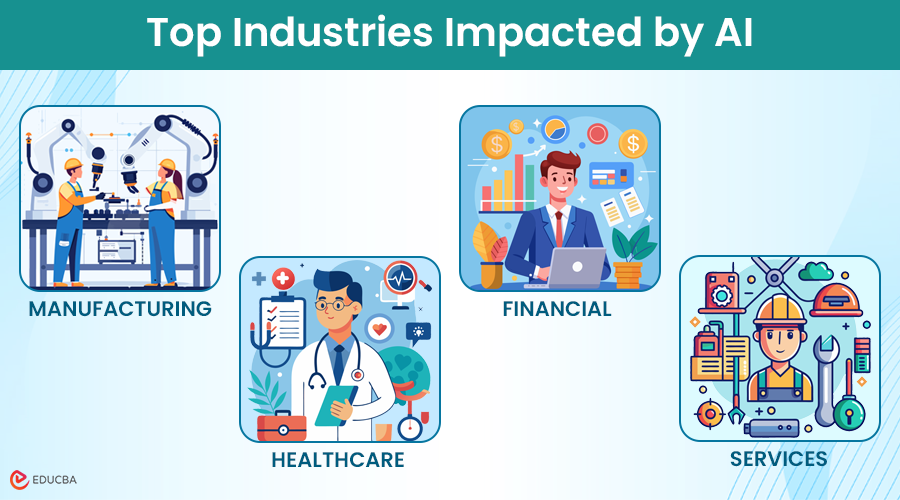Impact of AI on Industries – Overview
In recent decades, AI has grown exponentially, evolving from simple automation programs to complex systems that learn and adapt autonomously. The initial industrial applications of AI were limited to repetitive and predictable tasks. As technologies progress, AI is now addressing increasingly complex issues. The impact of AI on industries is revolutionary. It is changing the way industries operate, enhancing their efficiency and productivity.
Top Impacts of AI on Industries
#1. Manufacturing Sector
AI has transformed the manufacturing industry by automating and refining production processes. Technologies such as advanced robots and automated control systems increase precision and efficiency, reducing production costs. Additionally, predictive analytics enable the anticipation of maintenance issues, improving the reliability and longevity of machines.
#2. Healthcare Sector
In the healthcare sector, AI enhances the diagnosis and treatment of diseases. By examining medical data, machine learning algorithms detect patterns and irregularities that could elude human observation. This results in more precise and prompt diagnosis, as well as tailored treatments for patients. Furthermore, surgical robots and telemedicine applications are transforming medical practices, making care more accessible and efficient.
#3. Financial Sector
AI in finance is enhancing risk management, fraud detection, and financial data analysis. It simplifies analyzing huge volumes of data and identifying patterns that indicate suspicious activities or investment opportunities. Banks and financial institutions also use chatbots and virtual assistants to improve customer service, providing quick and precise responses.
#4. Services Sector
In the services sector, AI is revolutionizing company-customer interactions. AI chatbots and virtual assistants provide round-the-clock assistance, enhancing customer satisfaction and minimizing wait times. Moreover, the analysis of customer data allows companies to offer personalized services and continuously improve their offerings.
Challenges of Adapting to AI
#1. Resistance to Change
A significant hurdle in adopting AI is the resistance from employees and managers to change. Introducing new technologies often sparks concerns about job displacement or drastic alterations in work practices. It’s crucial to execute change management strategies involving training, communication, and support to ease the transition and alleviate employee concerns.
#2. Implementation Issues
Implementing AI can present various problems, including integration with existing systems, data quality, and the complexity of algorithms. Companies must invest in adequate technological infrastructures and staff training to overcome these challenges. Additionally, collaboration with AI experts and specialized consultants can help ensure an effective and smooth implementation.
The Importance of AI Training by MAC Formazione: A Center of Excellence
The implementation of artificial intelligence in industries represents an opportunity for growth and innovation, but also a significant challenge for many companies. To tackle these challenges, it is crucial to invest in specialized training.
Training centers play a key role in providing the necessary skills to understand and use artificial intelligence technologies. Companies must constantly update training programs to reflect the latest trends and developments in the field of AI.
In this context, MAC Formazione emerges as a center of excellence, offering advanced courses that prepare professionals to understand and apply AI technologies in their daily work. Continuous training ensures that employees are up-to-date on the latest trends and tools, contributing to a smoother and more effective transition toward automation and technological innovation.
MAC Formazione stands out for the quality of its educational programs that provide practical skills and deep theoretical knowledge essential for navigating the era of artificial intelligence.
Final Thoughts
Artificial intelligence will continue to transform industries. Therefore, companies that embrace AI will stay ahead by innovating, improving productivity, and offering new products and services. However, it is essential that companies adopt a strategic and well-planned approach to maximize the benefits of AI and minimize associated risks.
Adopting AI is not a one-time process but requires continuous adaptation and constant updating of skills. AI technologies evolve rapidly, and companies must prepare to evolve along with them. Thus, continuous training, innovation, and collaboration with industry experts are crucial.
Recommended Articles
We hope you find this guide on the impact of AI on industries helpful. Here are other AI-based guides.




